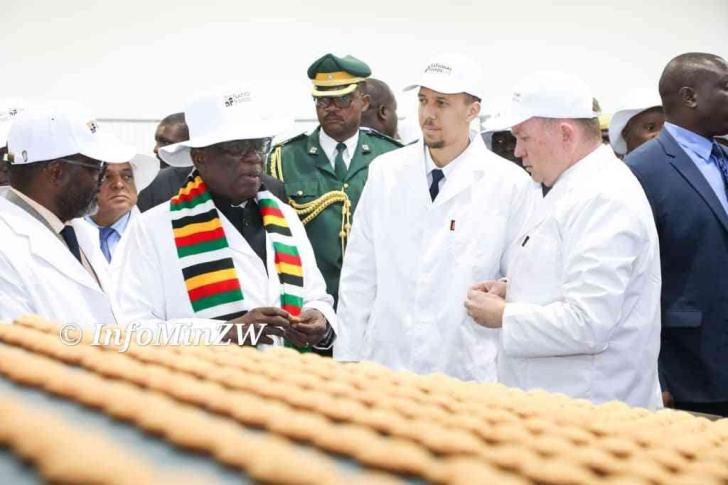News / National
Mnangagwa challenges NatFoods to raise exports
30 May 2025 at 08:46hrs |
0 Views

President Emmerson Mnangagwa has challenged National Foods Holdings Limited to intensify its regional export efforts following the commissioning of the company's new production lines for pasta, biscuits, and breakfast cereals at its Harare facility.
Speaking at the official commissioning ceremony, Mnangagwa hailed the US$40 million investment made by National Foods over the past three years to modernise its operations and boost production capacity. Of that amount, US$7.7 million was allocated to the biscuit production line, US$6 million to the pasta line, and US$7 million to breakfast cereals, as the company targets both local and export markets.
"I urge the company to continue on its strategic trajectory and ensure that you operate around the clock, which will, in turn, increase output and save the country foreign currency," Mnangagwa said. "With such investments, Zimbabwe can now meet local demand and strengthen its position as a regional supplier."
The President commended the company's current exports to Zambia, Botswana and South Africa, but challenged National Foods to expand its reach further across the continent. He said such regional integration efforts would help boost employment, foreign currency earnings, and economic diplomacy.
Highlighting Zimbabwe's high reliance on pasta imports, Mnangagwa noted that the new pasta production line - capable of producing up to 1,200 tonnes per month - will significantly reduce the national import bill. The line also boasts an additional capacity of two tonnes per hour, positioning it to cater to a substantial portion of the country's 5,000-tonne monthly pasta demand.
The biscuit line is expected to produce up to 1,300 tonnes monthly using advanced technology, while the breakfast cereal line has a production target of 800 tonnes per month.
"Investments like the one being commissioned today exemplify the importance of local content and value addition," Mnangagwa said. "By transforming raw agricultural produce into finished goods locally, we promote economic empowerment, deepen self-sufficiency, and develop local industries."
He described the developments as symbols of Zimbabwe's resilience and potential, noting that with the right partnerships, government support, and technological innovation, the country can compete regionally and globally.
"These plants symbolise the spirit of Zimbabwe: innovative, resourceful, and forward-looking," he said. "Our motherland can produce what we need."
Mnangagwa also reiterated his government's commitment to improving the ease of doing business and creating a conducive environment for investment and industrial growth. He praised National Foods and its partners for their confidence in Zimbabwe and called on other companies to follow suit in building a productive and export-oriented economy.
Speaking at the official commissioning ceremony, Mnangagwa hailed the US$40 million investment made by National Foods over the past three years to modernise its operations and boost production capacity. Of that amount, US$7.7 million was allocated to the biscuit production line, US$6 million to the pasta line, and US$7 million to breakfast cereals, as the company targets both local and export markets.
"I urge the company to continue on its strategic trajectory and ensure that you operate around the clock, which will, in turn, increase output and save the country foreign currency," Mnangagwa said. "With such investments, Zimbabwe can now meet local demand and strengthen its position as a regional supplier."
The President commended the company's current exports to Zambia, Botswana and South Africa, but challenged National Foods to expand its reach further across the continent. He said such regional integration efforts would help boost employment, foreign currency earnings, and economic diplomacy.
Highlighting Zimbabwe's high reliance on pasta imports, Mnangagwa noted that the new pasta production line - capable of producing up to 1,200 tonnes per month - will significantly reduce the national import bill. The line also boasts an additional capacity of two tonnes per hour, positioning it to cater to a substantial portion of the country's 5,000-tonne monthly pasta demand.
The biscuit line is expected to produce up to 1,300 tonnes monthly using advanced technology, while the breakfast cereal line has a production target of 800 tonnes per month.
"Investments like the one being commissioned today exemplify the importance of local content and value addition," Mnangagwa said. "By transforming raw agricultural produce into finished goods locally, we promote economic empowerment, deepen self-sufficiency, and develop local industries."
He described the developments as symbols of Zimbabwe's resilience and potential, noting that with the right partnerships, government support, and technological innovation, the country can compete regionally and globally.
"These plants symbolise the spirit of Zimbabwe: innovative, resourceful, and forward-looking," he said. "Our motherland can produce what we need."
Mnangagwa also reiterated his government's commitment to improving the ease of doing business and creating a conducive environment for investment and industrial growth. He praised National Foods and its partners for their confidence in Zimbabwe and called on other companies to follow suit in building a productive and export-oriented economy.
Source - newsday
Join the discussion
Loading comments…
































